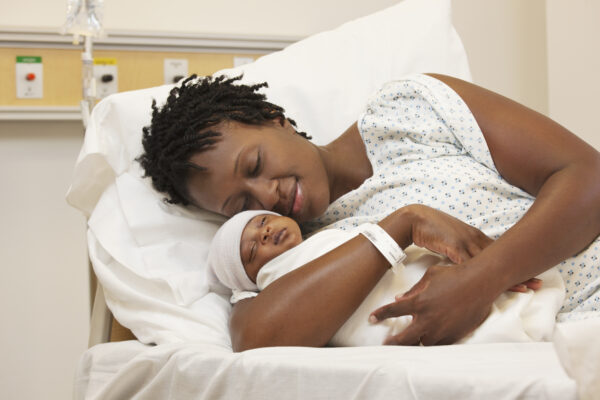While Black women are twice as likely to be infertile than white women, an additional barrier when seeking assistance reproducing — egg and sperm donor shortages — is now exacerbated by the COVID-19 pandemic.

According to the National Institutes of Health (NIH), 11 percent of women of reproductive age in the U.S. have faced reproductive problems. Although Centers for Disease Control and Prevention data show the national birth rate is higher among Black women than White women, NIH research also shows married Black women have almost twice the odds of infertility as married white women.
According to the International Fertility Law Group, reproductive conditions such as fibroids, endometriosis, PCOS also disproportionally impact Black women and could lead to infertility.
Michigan journalist Rhonda Spencer knew she would have problems conceiving when she married Jamal. So the couple looked into in vitro fertilization, known as IVF, but Rhonda later found out that she would also need an egg donor. Then Rhonda and Jamal hit another stumbling block in their attempt to start a family.
While males can face sperm reproduction issues and infertility too, research shows that hormonal and structural problems could make it hard to conceive even with assisted reproductive technology, leading to the need for donor replacements.
“Then we find out that here in West Michigan, there are no Black donors available for us,” Rhonda told 13 On Your Side, the local ABC affiliate, where she worked as a producer. “As a Black woman, I want to have a Black child. It was a hurdle that I hadn’t even thought about would be an issue, and to find out that there were none, not one, was very shocking to me and heartbreaking.”
Experts say Black sperm and egg donor shortages have existed since the late 1980s. Still, the absence of young professionals and college students in metro areas because of COVID-19 restrictions and modified work settings have made recruitment a greater challenge.
Once accepted, a sperm donor must return once or twice a month for six months, the International Fertility Law Group said. Egg donors have to go through at least three months of screenings. They must self-inject hormones and medications on a strict schedule for weeks, the fertility group said.
Officials at the fertility center in Grand Rapids, where Rhonda lives, said just 5 percent out of 1,000 egg donor applicants were Black over three years.
Even at the nation’s largest sperm banks, there is a low quantity of Black sperm available, the Wall Street Journal reported.
According to the WSJ, during one week in February, four out of the 242 available sperm donors at California Cryobank said they were Black, and 18 of 360 donors at Fairfax Cryobank, based in Fairfax, Va., identified as Black. California Cryobank Medical Director Dr. Jaime Shamonki said they “cannot replenish the catalog fast enough to meet demand.” Shamonki said the sperm bank is now looking for ways to recruit more Black donors.
Sperm donors are screened based on their genetics such as height, weight and medical and psychological history. They must pass infectious-disease testing, a criminal-background check and semen analysis. Sperm donors must be attending college or have a college degree. Some sperm banks allow donors to substitute professional experience for a college degree.
Egg donors must pass psychological and medical screenings, including testing for the sickle anemia trait, which is more prevalent in Black people.
Experts have also found Black donor shortages in the U.K.
Dr. Stacey Edwards-Dunn, founder of Fertility for Colored Girls, said a stigma about fertility in the Black community stalls treatment. It starts with the misconception that Black women are fertile, which is rooted in slavery.
“Much of this comes from breeding myths during slavery around our ability to be able to give birth,” Edwards-Dunn said. “But the reality is, these myths are incorrect. So it begins with how we have been socialized and educated around our own reproductive health and our Black bodies.”
Edwards-Dunn said Black women and couples mistrust medical professionals, also triggered by past abuse and disregard for Black people in the medical and science field. In part, most IVF marketing and research have not included Black women or Black families.
Edwards-Dunn and other fertility advocates said fertility care providers need cultural sensitivity and diversity training to check their hidden biases. There is also a lack of Black professionals in the field.
“Something I hear from Black women and couples is they want the doctor and team to partner up with them in their treatment — not to look down on them or talk at them,” Edwards-Dunn said. “They want someone to walk with them on their journeys.”
13 On Your Side reported that four women immediately reached out to the Grand Rapids fertility center inquiring about egg donation when Rhonda and Jamal’s story aired last March. However, it is unclear if the couple have been able to conceive since then.
Aisha Jenkins, a 46-year-old project manager in Washington, D.C., said she opted for sperm donors with Egyptian and Indian ancestry when she ran into issues finding Black sperm.
“I knew there were other colors in the spectrum that would give me a brown child,” Jenkins told the WSJ.
Some families who run out of options or are not in the financial position to afford IVF have turned to private donors for assistance. Numerous Facebook pages are dedicated to egg and sperm donations. Health experts, however, warn against private sperm donation because of the lack of screenings.
The COVID-19 pandemic, on the other hand, has brought health care disparities to the forefront, highlighted through the Black Lives Matter movement, where there have been calls for health equity.


